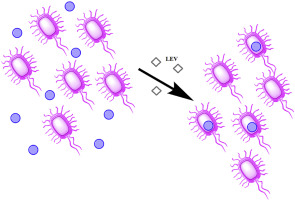Ecotoxicology and Environmental Safety ( IF 6.8 ) Pub Date : 2020-03-14 , DOI: 10.1016/j.ecoenv.2020.110461 Hai-Yan Wu 1 , Dan-Yang Shi 2 , Dong Yang 2 , Jing Yin 2 , Zhong-Wei Yang 2 , Jun-Wen Li 2 , Wu Yang 3 , Min Jin 2

|
Antibiotic residues in the environment pose a great risk to global public health. They increase antibiotic resistance by enhancing plasmid conjugation among bacteria or mutations within bacterial genomes. However, little is known about whether the putative environmental levels of antibiotics are sufficient to influence plasmid-mediated transformability. In this study, we explored the effect of eight kinds of representative antibiotics and several other compounds on the plasmid transformability of competent Escherichia coli. Only levofloxacin (LEV) at the putative environmental levels was found to facilitate the frequency of PBR322-or RP4-plasmid–mediated transformation by up to 5.3-fold. Additionally, PBR322 transformation frequency could be further enhanced by copper ion or ammonia nitrogen but inhibited by humic acid. However, when competent E. coli was exposed to the minimal inhibitory concentrations (MIC) of the antibiotics, an enhanced plasmid-assimilation ability was observed and plasmid transformation frequency was increased by up to 98.6-fold for all the tested antibiotics. Furthermore, E. coli exhibited a preference for the uptake of plasmids harbouring the resistance genes to the antibiotics it had been exposed to. Among these antibiotics, cephalexin, tetracycline, and kanamycin induced the highest uptake of RP4. The putative environmental levels of LEV enhanced plasmid transformability regardless of the presence of corresponding antibiotic resistance gene (ARG) on the genetic elements, suggesting environmental LEV residues may facilitate dissemination of antibiotic resistance by any plasmid-mediated transformability, thereby posing a great risk to health.
中文翻译:

假定的环境水平的左氧氟沙星通过质粒介导的可转化性促进了抗生素耐药性大肠杆菌的传播。
环境中的抗生素残留对全球公共健康构成巨大风险。它们通过增强细菌之间的质粒结合或细菌基因组内的突变来增加抗生素抗性。但是,关于抗生素的假定环境水平是否足以影响质粒介导的可转化性知之甚少。在这项研究中,我们探讨了八种代表性抗生素和其他几种化合物对感受态大肠杆菌质粒转化能力的影响。。仅在假定的环境水平下发现左氧氟沙星(LEV)可以促进PBR322或RP4质粒介导的转化的频率高达5.3倍。此外,铜离子或氨氮可进一步提高PBR322的转化频率,但腐殖酸会抑制PBR322的转化频率。但是,当感受态大肠杆菌暴露于抗生素的最低抑制浓度(MIC)时,观察到增强的质粒同化能力,并且所有测试抗生素的质粒转化频率均提高了98.6倍。此外,大肠杆菌对于具有所暴露的抗生素的抗性基因的质粒,其表现出偏好。在这些抗生素中,头孢氨苄,四环素和卡那霉素诱导了RP4的最高吸收。假定的LEV环境水平增强了质粒的可转化性,而与遗传元件上是否存在相应的抗生素抗性基因(ARG)无关,这表明环境LEV残基可能通过任何质粒介导的可转化性促进抗生素抗性的传播,从而对健康构成了巨大风险。



























 京公网安备 11010802027423号
京公网安备 11010802027423号